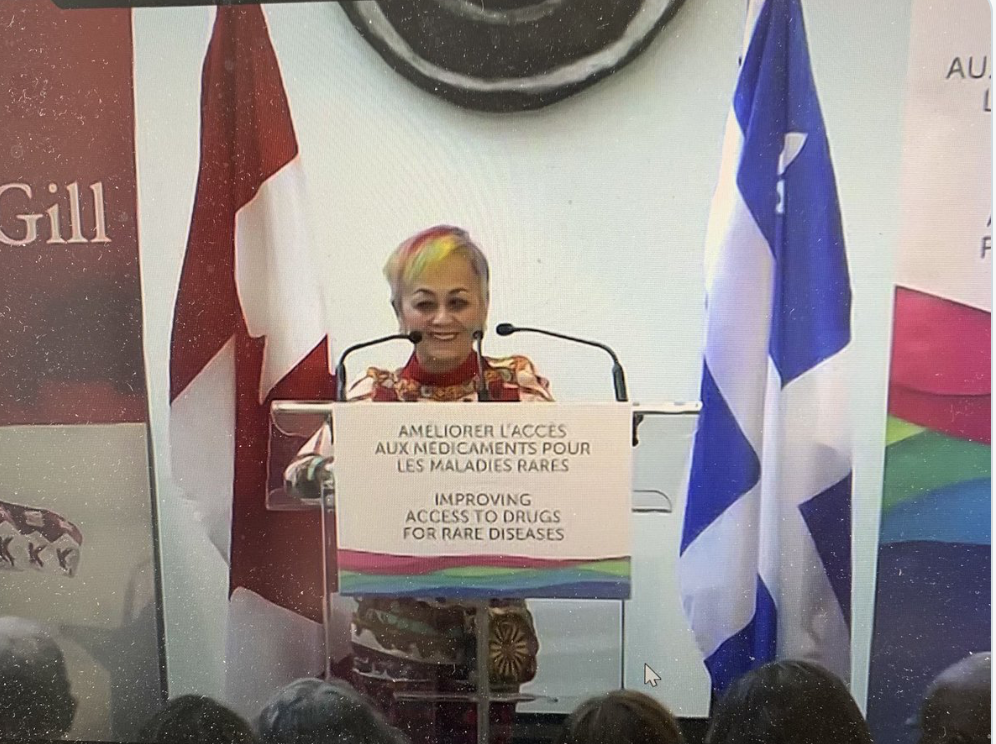
Canadian Organization for Rare Disorders welcomes federal funding for rare drug plan to accelerate access to diagnostics and treatments
March 22, 2023
A significant investment of federal funding will boost health system capacity to deliver screening, diagnostics and rare disease medicines and to incentivize research into rare diseases, in fulfillment of a commitment made to the 3 million Canadians living with a rare disorder
“CORD is especially gratified that the federal government heard our recommendations for a comprehensive strategy that includes investment in infrastructure, including centres of expertise, that will facilitate faster diagnosis and treatment access with on-going patient monitoring and data collection. This is a major step to value-based pharmacare and healthcare” – Durhane Wong-Rieger
“TORONTO, March 22, 2023 /CNW/ – The Canadian Organization for Rare Disorders (CORD) was extremely pleased to be part of the federal government’s announcement today of the plan to provide up to $1.5 billion over three years to implement the Rare Disease Drug Strategy, as committed in 2019.
It was altogether fitting that patients were on the agenda since CORD has been conducting multistakeholder consultations to generate strategies that first and foremost meet identified patient needs but also ensure health system capacity and return value to society. The plan, designed to provide earlier and more equitable access to diagnosis and treatments, will be developed and executed in collaboration with the drug programs in the provinces and territories as well the Non-Insured Health Benefits (NIHB) program covering Indigenous Canadians with rare disorders.
“Canada has the opportunity to implement the world’s best program for rare disease patients” — Durhane Wong-Rieger Tweet this
Federal Health Minister Jean-Yves Duclos made the announcement of the new funding at McGill University in Montreal, accompanied by Durhane Wong-Rieger, President of CORD, and patient leaders from the Regroupement québécois des maladies orphelines (RQMO) and Best Medicines Coalition.
A recent Ipsos survey of Canadian patients released on Rare Disease Day, Feb. 28, showed that lack of access to drugs is one of the major issues they face, along with long delays in diagnosis, disease and knowledge information gaps, and lack of coordinated and accessible care.
CORD welcomes the new drug funding announcement that will boost comprehensive rare disease strategies emerging across Canada, building on the Rare Disease Strategy launched by CORD in 2015. “CORD is especially gratified that the federal government heard our recommendations for a comprehensive strategy that includes investment in infrastructure, including centres of expertise, that will facilitate faster diagnosis and treatment access with on-going patient monitoring and data collection. This is a major step to value-based pharmacare and healthcare,” said Wong-Rieger.
For decades, Canada has been one of the only developed countries without a national rare disease plan, Wong-Rieger noted. “With this announcement, Canada has the opportunity to implement the very best program in the world for rare disease patients. Our recent Ipsos survey showed that access to drugs is a major barrier for many Canadians with rare diseases, who wait too long and sometimes never get access to therapies that are available much earlier in Europe and the United States.”
Regarding Ottawa’s plans to sign bilateral agreements with the provinces, Wong-Rieger said, “Patients need to be officially included in the entire process, from the outset, as equal partners in the discussions between the federal government and the provinces and territories.”
Indeed, this announcement comes at an opportune time. CORD’s Rare Disease Day Conference, scheduled to take place Ottawa on March 28-29, will be able to directly consider the contents of the announced plan in its discussions on diagnosis, centres of expertise, value-based managed access drug plans, and patient outcomes data collection.
The Ipsos survey also showed that creation of centres of expertise was the much-preferred option of rare disease patients to ensure they have access to all the tests, services and care that are needed for effective treatment of rare diseases.
The need for a comprehensive strategy and services was made clear by a patient in the survey: “Treating a patient with a rare disease goes beyond access to rare and expensive drugs. Rare disease centres would address a wide variety of gaps that exist in the diagnosis and treatment of rare diseases.”
About Canadian Organization for Rare Disorders (CORD)
CORD is Canada’s national network for organizations representing all those with rare disorders. CORD provides a strong common voice to advocate for health policy and a healthcare system that works for those with rare disorders. CORD works with governments, researchers, clinicians and industry to promote research, diagnosis, treatment and services for all rare disorders in Canada. For more information, visit www.raredisorders.ca
SOURCE CANADIAN ORGANIZATION FOR RARE DISORDERS (CORD)
For further information: For interviews and media enquiries: Don Sancton on behalf of CORD, (514) 206-1191, dsancton@3sixtypublicaffairs.com
CORD press release: bit.ly/3FDU3Ub
Health Canada press release: https://lnkd.in/gR3A_3YJ

Durhane Wong-Rieger
President & CEO
Canadian Organization for Rare Disorders

Durhane Wong-Rieger
President & CEO
Canadian Organization for Rare Disorders
Jean-Yves Duclos, Minister of Health of Canada

Durhane and Michel Long, Canadian Hemochromatosis Society

Durhane with Jonathan Pratt
Directeur général – Regroupement québécois des maladies orphelines (RQMO)
John Adams, CanPKU
Event
RARE DISEASE DAY 2024 CANADIAN ILLUMINATIONS
On February 29, 2024 these monuments will be lit up in honor of Rare Disease Day. #LightUpForRare Amherst Town Hall in Amherst Nova ScotiaBrampton Clock TowerBritish Columbia LegislatureBritish Columbia PlaceCalgary TowerEdmonton High Level BridgeEdmonton TowerFred A. Lundy bridge in Newmarket, ONMississauga City HallNanaimo BastionNiagara Falls (10:00pm – 10:15pm.) [Live cam link: https://www.earthcam.com/canada/niagarafalls/?cam=niagarafalls_str]Niagara sign in Thorold/Niagara regionOakville Town HallOlympic Cauldron Vancouver Convention CentrePeterborough City HallSales Of Light VancouverScience World Vancouver (FEB 28th)Signal Hill in St. John’s, NLThe Hamilton SignToronto CN TowerToronto Sign in Nathan Phillips SquareVaughan City HallVancouver Convention CentreThe Peace Bridge between Canada and the US Winnipeg Sign Winnipeg Bridge Let us know if there are other Canadian illuminations to add. Tag us on social media @raredisorders (Twitter/X), @raredisorders_cord (Instagram) or email us at info@raredisorders.ca with your photos of the monuments and Rare Disease Day events.
BECOME A MEMBER
Join us and become part of an active Canadian rare disorder community. The only national organization representing all rare disorder patient groups in Canada.
LEARN MORE